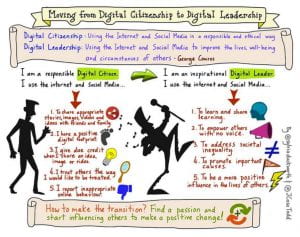When considering the subject learning outcomes for ETL523 it felt timely to assess my personal outcomes for the new and further established understandings that I have gained as a result of undertaking Digital Citizenship in Schools. Going back to my teaching pedagogy of critically reflecting on the intended success criteria, it seemed appropriate to assess my understandings of the concept of digital citizenship and its applications in preparing a school digital learning environment. I also critically considered the role of digital learning environments in schools and its purpose.
When working through topic 1.1 we encountered readings and posts around the key concepts of digital citizenship. These topics challenged my preconceived definition of what made a digital citizen as discussed in ETL523 – Digital Citizenship Reflective Blog and further deepened my understanding that a digital citizen approach is one that is defined in a recent blog post by Terry Heick (2018), The definition of digital citizenship, where the post reveals an evolving and maturing approach, and one that can be adopted as educators and learners. He states that;![]()
Working through the course content I was able to further develop my understanding of digital citizenship to not only be an active, reliable and responsible digital user, but one that can go further and use this knowledge responsibly to act in order to influence or encourage others to be the same. Digital Citizenship I now know to be supported with personal actions through the use of globally connected learning where one can learn from and teach others. This is known as described by Sylvia Duckworth and Jennifer Casa-Todd as ‘Digital Citizenship Action’. See below for further explanation.
With the goal to develop Leaders in ‘Digital Citizenship’ in schools and other educational settings, the question is, how do we support learners to make this transition? This question comes riddled with interlinked issues including social pressures from the community and globally to provide appropriate digital learning opportunities. A large factor to consider is the readiness of the traditional teacher educator and their confidence to teach with ever-evolving technology. Determining appropriate technology required and available Digital Learning environments (DLE) also directly affect the learning opportunities that can be provided to the developing digital citizen.
Learning and further developing my understandings around digital citizenship was also supported by online learning opportunities where I was able to engage in topical questions posed in the forums during ETL523, however I found that I engaged more through reading professional dialogue between my peers online rather than an actively engaging and responding. This upon reflection was as I feel more comfortable voicing opinions in person than with unknown communities online. An interesting factor for me to consider when considering who is vocal online and who is remaining quiet as this could be much the same for implementing digital tools into a DLE for the school setting in which I work in.
Through other subjects and reflections when considering the use of digital connectivity and through other forums that I have professionally engaged in such as Twitter and Facebook, I have promoted and implemented digital citizenship in schools through developing a eSmart Digital Citizenship program for students, provided professional learning opportunities for staff and launched a school wide Facebook page inclusive of a implementation plan, policies and procedures
Through the modules and Environmental Scan Report devised for this subject, it has become evident to me the importance for my role as the eLearning leader to be proactive and instrumental when participating in planning for developing work ready digital citizens. It is imperative that there is a vision and clear steps to achieve implementation of what can be a daunting area to include into an otherwise traditional curriculum environment. Timelines, policy development, guidelines and clear communication directly supports the development of digital citizenship in schools. In The connected educator: Learning and leading in a digital age, Nussbaum-Beach (2013), she shares her insights into the research behind connected learning, writing about how networking, collaboration, collegiality and sharing of practice impact positively on student achievement.
References
- Nussbaum-Beach, C. (2013). The connected educator: Learning and leading in a digital age. http://www.amazon.com/The-Connected-Educator-Learning-Leading/dp/1935543172.
- New Zealand Ministry of Education – Digital technology: Safe and responsible use in schools(2015)
- TeachThought Staff (2018, November 18). Moving students from digital citizenship to digital leadership. https://www.teachthought.com/the-future-of-learning/moving-students-from-digital-citizenship-to-digital-leadership/